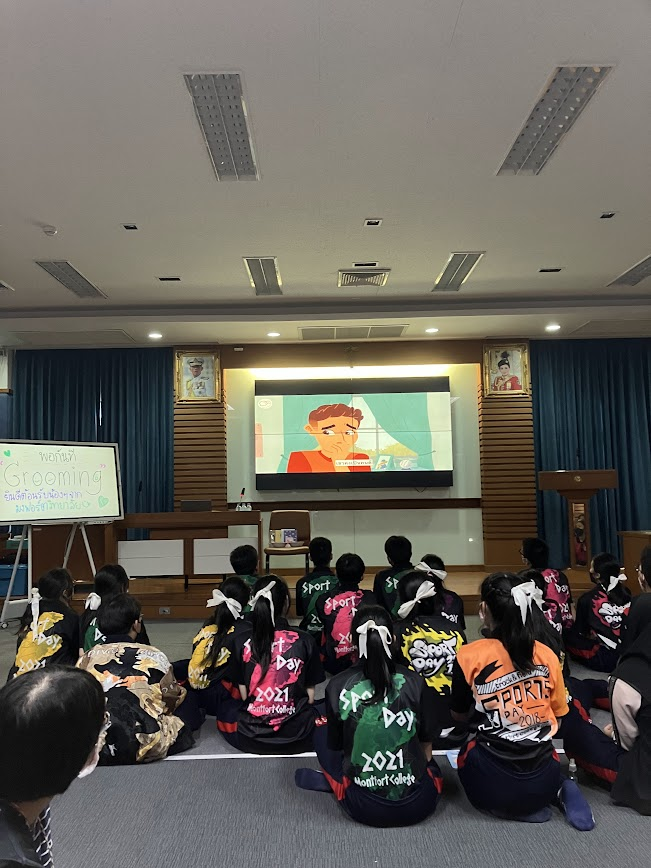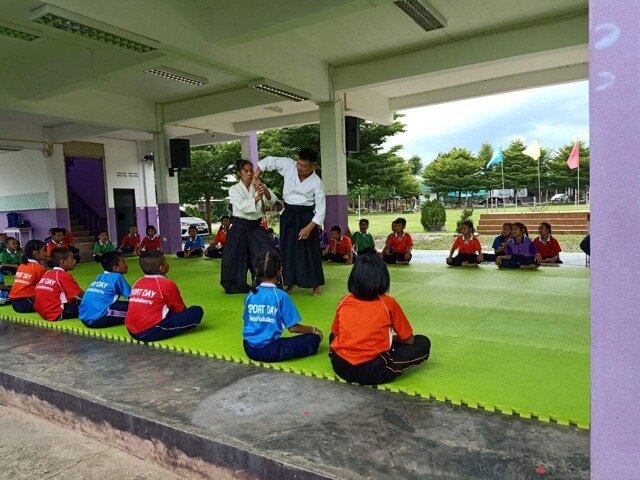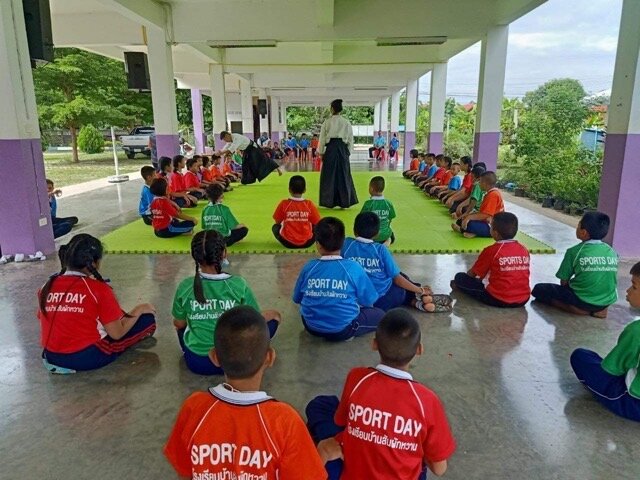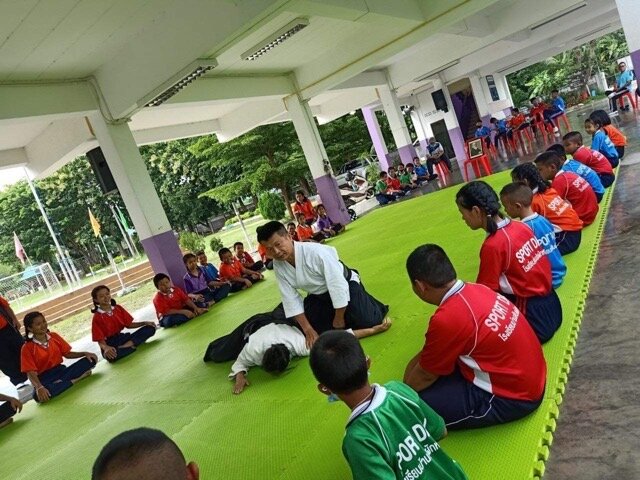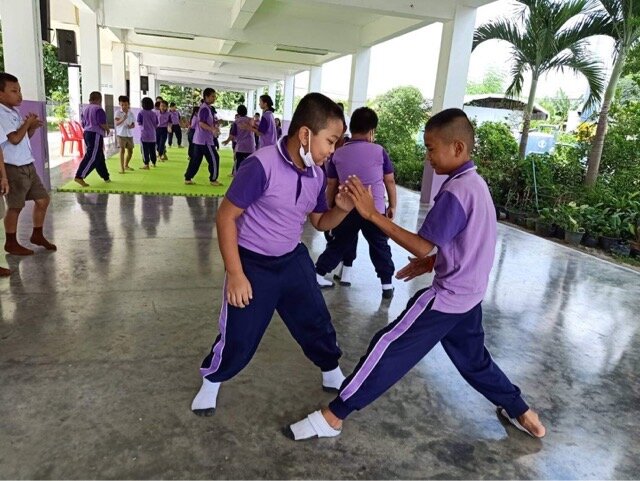โครงการของเรา
2566 - ปัจจุบัน
โครงการป้องกันการล่วงละเมิดทางเพศในเด็กนักเรียน: พอกันทีกรูมมิ่ง (Train-the-Trainer) หลักสูตรสำหรับวิทยากร
วัตถุประสงค์
เพื่อฝึกฝนกลุ่มวิทยากรนักเรียนระดับชั้นมัธยมปลาย ที่มีทักษะและความรู้ความเข้าใจเรื่องภัยกรูมมิ่ง (Grooming) ผ่านคู่มือการจัดอบรม หลักสูตรป้องกันการล่วงละเมิดทางเพศในเด็กนักเรียน: “พอกันที กรูมมิ่ง” โดยคู่มือในหลักสูตรสามารถนำไปเผยแพร่ให้เกิดความตระหนัก รู้ทัน ป้องกันและรับมือได้อย่างประสิทธิภาพ และสร้างโครงการต่อยอดหลังการอบรม (School project) โดยกลุ่มวิทยากรนำไปเผยแพร่ในพื้นที่ด้วยตนเอง ผ่านการสนับสนุนจากมูลนิธิศานติวัฒนธรรม
หัวใจของโครงการ “ให้เด็กไปพูดกับเด็ก”
จากการสำรวจสถานการณ์เด็กกับภัยออนไลน์ ประจำปี 2565 (จากเด็กอายุ 9-18 ปี จำนวน 31,965 คน) โดยมูลนิธิอินเทอร์เน็ตร่วมพัฒนาไทย ร่วมกับ COPAT พบว่า เด็กที่ถูกล่อลวงเพื่อล่วงละเมิดทางเพศออนไลน์ (Online Grooming) ร้อยละ 35 เลือกที่จะบอกเหตุการณ์ที่เกิดขึ้นกับ "เพื่อน" ที่ไว้ใจ ก่อนที่จะบอกพ่อแม่ ครอบครัว หรือผู้ใหญ่คนอื่น ๆ ดังนั้น การสนับสนุนให้ "เด็กไปพูดกับเด็ก" จึงมีความสำคัญมากที่เด็กและเยาวชนต้องเข้าใจเรื่องกรูมมิ่ง มีทักษะในการส่งต่อความรู้ แบบ Peer advocacy รวมถึงช่องทางในการขอความช่วยเหลือจากหน่วยงานที่เกี่ยวข้อง
ความคืบหน้า
ขณะนี้ (พ.ศ.2567) มูลนิธิศานติวัฒนธรรมได้ดำเนินการอบรมเพื่อสร้างวิทยากรนักเรียนแล้ว 11 รุ่น นับเป็นจำนวนกว่า 440 คน ทั้งในพื้นที่จังหวัดเชียงใหม่ กรุงเทพ และ 5 จังหวัดชายแดนภาคใต้ ด้วยความร่วมมือจากหลากหลายภาคส่วน ไม่ว่าจะเป็น Thailand Rotary Action Group Against Slavery Team (TRAGAST) สำนักงานพัฒนาสังคมและความมั่นคงของมนุษย์จังหวัดเชียงใหม่ สภาเด็กและเยาวชนจังหวัดเชียงใหม่ กรมกิจการเด็กและเยาวชน องค์กรยูนิเซฟ ประเทศไทย รวมถึงมหาวิทยาลัย โรงเรียนและหน่วยงานที่ให้ความสำคัญในการสร้างความตระหนักรู้เรื่อง "กรูมมิ่ง" อีกมากมาย
เรายังคงเดินหน้าต่อเพื่อสร้างวิทยากรนักเรียน หลักสูตร "พอกันทีกรูมมิ่ง" ให้เกิดการเผยแพร่ความรู้ออกสู่ทุกพื้นที่ของประเทศไทยอย่างมีประสิทธิภาพ ท่านสามารถสนับสนุนการทำงานของเราได้ ที่นี่
2565 - ปัจจุบัน
การอบรมเชิงปฏิบัติการ “พอกันที กรูมมิ่ง” สำหรับนักเรียนมัธยมศึกษาตอนต้นและตอนปลาย
วัตถุประสงค์
เพื่อเรียนรู้เกี่ยวกับ “กรูมมิ่ง” และลักษณะขั้นตอนของพฤติกรรม กระทั่งเกิดความตระหนักรู้และเท่าทันต่อสถานการณ์ที่เกิดขึ้น
เพื่อแสวงหาแนวทางและสร้างความร่วมมือในการป้องกันการกรูมมิ่งที่ได้ผล
เพื่อกระตุ้นให้เกิดการเผยแพร่ความรู้เรื่องกรูมมิ่งไปยังพื้นที่รอบตัว
เพื่อเสริมทักษะการจัดการกับปัญหาในรูปแบบแห่งสันติ ปราศจากความรุนแรง
ความคืบหน้า
เริ่มดำเนินโครงการตั้งแต่เดือนมิถุนายน พ.ศ. 2565 ปัจจุบัน (2567) มีเด็กนักเรียนในระดับชั้นมัธยมศึกษาตอนต้นและมัธยมศึกษาตอนปลายที่เข้าร่วมโครงการกว่า 1,400 คน จาก 17 โรงเรียนในพื้นที่จังหวัดเชียงใหม่ เรายังคงดำเนินการต่อเนื่องเพื่อขยายความรู้เกี่ยวกับกรูมมิ่งเข้าสู่พื้นที่โรงเรียนให้มากที่สุด ท่านสามารถสนับสนุนการทำงานของเราได้ ที่นี่
ลักษณะการอบรม
การอบรม “พอกันที กรูมมิ่ง” เป็นการอบรมเชิงปฏิบัติการ ที่เรียนรู้ผ่านการร่วมกิจกรรมโดยบูรณาการเนื้อหาเกี่ยวกับภัยกรูมมิ่งเข้ากับเหตุการณ์ในชีวิตประจำวัน ซึ่งได้ปรับเนื้อหาออกเป็น 2 หลักสูตร คือระดับมัธยมศึกษาตอนต้นและตอนปลายเพื่อให้ผู้เข้าร่วมซึ่งเป็นเด็กนักเรียนระดับมัธยม สามารถเข้าใจเนื้อหาได้ดีมากยิ่งขึ้น กระทั่งสร้างความตระหนักและเท่าทันต่อการกรูมมิ่งในพื้นที่รอบตัวและในโลกออนไลน์ ซึ่งที่ผ่านมาได้รับผลการตอบรับอย่างดียิ่ง มีผลการประเมินกิจกรรมหลังการเข้าร่วมในระดับดีมากในทุกประเด็น มีข้อมูลภาคสนามที่เป็นประโยชน์อย่างยิ่งต่อการดำเนินการป้องกันการล่วงละเมิดทางเพศ ทำให้เข้าถึงนักเรียนรายกรณีที่กำลังประสบเหตุ สามารถให้ความช่วยเหลือ และดำเนินการร่วมกับภาครัฐได้อย่างทันท่วงที
2553 - 2556
การปลูกฝังวัฒนธรรมสันติภาพอย่างยั่งยืนในโรงเรียน
โครงการนี้ได้รับทุนสนับสนุนจาก Global Grant ของ Rotary International ผ่าน Rotary of Bangkok
วัตถุประสงค์
โครงการระยะเวลา 3 ปีนี้มุ่งเน้นการปลูกฝังทัศนคติ ค่านิยม และพฤติกรรมที่ส่งเสริมสังคมในโรงเรียนประถมศึกษาขนาดเล็กแห่งหนึ่งในพื้นที่ชนบทของจังหวัดเชียงใหม่ นักเรียนจะได้รับการส่งเสริมให้พัฒนาคุณลักษณะเชิงบวก โดยได้รับการสนับสนุนจากผู้ปกครองและครู ผ่านโครงการนี้ วัฒนธรรมแห่งสันติภาพจะหยั่งรากลึกในโรงเรียน ผู้คนปฏิบัติต่อกันด้วยความเคารพและเมตตา พร้อมช่วยเหลือกันแทนที่จะเอาเปรียบกัน
มีความเป็นไปได้สูงว่า หลังจากดำเนินโครงการครบ 3 ปี ค่านิยมเรื่องการไม่ใช้ความรุนแรงและการอยู่ร่วมกันอย่างสันติจะกลายเป็นอัตลักษณ์ที่แข็งแกร่งของโรงเรียน เมื่อโครงการได้รับการประเมินผลขั้นสุดท้าย อาจมีการขยายผลไปยังโรงเรียนและสถาบันอื่น ๆ
ที่มาและความสำคัญ
งานวิจัยหลายชิ้นชี้ให้เห็นว่า แนวโน้มความรุนแรงและความก้าวร้าวของมนุษย์ส่วนใหญ่เป็นพฤติกรรมที่เรียนรู้จากการสังเกต การได้รับแบบอย่าง และการเผชิญกับความรุนแรงโดยตรง เด็กที่เติบโตขึ้นมาในสภาพแวดล้อมที่เต็มไปด้วยความรุนแรงและการใช้ความก้าวร้าวมักจะซึมซับค่านิยมเหล่านั้นและถ่ายทอดต่อไปยังความสัมพันธ์ของพวกเขาเอง เมื่อเข้าสู่วัยผู้ใหญ่ เริ่มต้นสร้างครอบครัว และเลี้ยงดูลูก ๆ วงจรแห่งความรุนแรงนี้ก็จะดำเนินต่อไป ซึ่งในทางจิตวิทยาเรียกปรากฏการณ์นี้ว่า "การถ่ายทอดความรุนแรงและบาดแผลข้ามรุ่น"
เมื่อผู้คนจำนวนมากในชุมชนยึดถือค่านิยมและความเชื่อเช่นนี้ วัฒนธรรมที่ครอบงำก็จะเป็นวัฒนธรรมที่มองว่าการใช้ความรุนแรงและความก้าวร้าวเป็นสิ่งที่ยอมรับได้และชอบธรรม ความรุนแรงอาจแสดงออกในรูปแบบของการลงโทษที่รุนแรงโดยพ่อแม่และครู การใช้ความรุนแรงเพื่อแก้ไขความขัดแย้ง พฤติกรรมกลั่นแกล้ง การล่วงละเมิด และการล่วงละเมิดทางเพศ ความรุนแรงในสังคมอาจขยายวงกว้างไปถึงความรุนแรงระหว่างกลุ่ม เช่น สงคราม การล่าอาณานิคม การใช้แรงงานและการแสวงหาประโยชน์ทางเศรษฐกิจ การค้ามนุษย์ การกวาดล้างชาติพันธุ์ หรือแม้แต่ความรุนแรงต่อสิ่งแวดล้อม
โครงสร้าง
โครงการนี้มีเป้าหมายเพื่อลดความรุนแรงในโรงเรียน ปลูกฝังวัฒนธรรมแห่งสันติภาพ และพัฒนาผู้นำรุ่นใหม่ โดยมีกิจกรรมหลัก ได้แก่
การประเมินสถานการณ์ของโรงเรียนเกี่ยวกับปัญหาความรุนแรง
การอบรมผู้ปกครองและครูเกี่ยวกับการลดการลงโทษและการกลั่นแกล้งผ่านวินัยเชิงบวก การป้องกันความรุนแรงระหว่างบุคคล และการป้องกันการกลั่นแกล้ง
การอบรมนักเรียนเกี่ยวกับการไกล่เกลี่ยข้อพิพาทระหว่างเพื่อนและทักษะการแก้ไขความขัดแย้ง
การจัดตั้งศูนย์ไกล่เกลี่ยข้อพิพาทในโรงเรียน
การจัดเวิร์กชอปเกี่ยวกับการสร้างสันติภาพ
การฝึกอบรมผู้นำนักเรียนและครูให้เป็นวิทยากรเพื่อสานต่อโครงการหลังสิ้นสุดระยะเวลาดำเนินการ
การประเมินผลขั้นสุดท้าย
กลุ่มเป้าหมาย
นักเรียน ผู้ปกครอง และครูในโรงเรียนประถมศึกษาขนาดเล็กแห่งหนึ่งในพื้นที่ชนบทของจังหวัดเชียงใหม่ โดยนักเรียนส่วนใหญ่มีอายุระหว่างระดับอนุบาลถึงชั้นประถมศึกษาปีที่ 6 และมาจากครอบครัวแรงงานข้ามชาติชาวไทใหญ่ที่มีรายได้น้อย โครงการนี้เป็นโครงการที่ครอบคลุมทั้งโรงเรียน โดยกลุ่มเป้าหมายได้แก่
นักเรียน 180 คน
ผู้ปกครอง 360 คน
ครู 14 คน
คณะกรรมการสถานศึกษา 10 คน ซึ่งเป็นผู้นำชุมชน
สมาชิกในชุมชนและเจ้าหน้าที่ภาครัฐในท้องถิ่นที่อาจนำแนวทางจากโครงการไปประยุกต์ใช้













